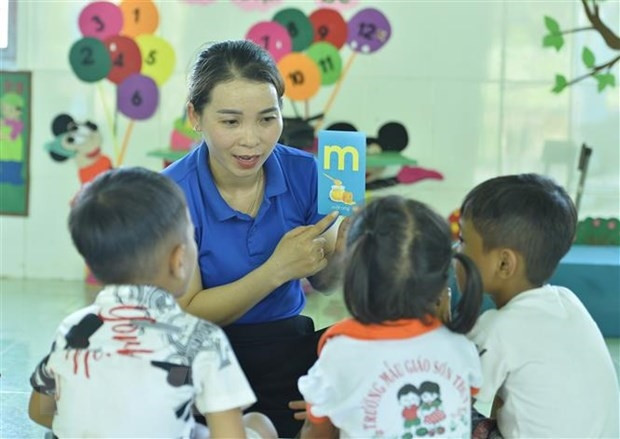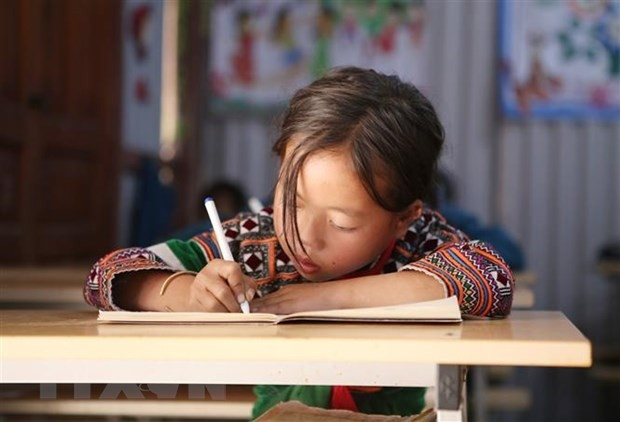Vietnamese lesson for first graders
At the 2022-2023 school year summary conference for Primary Education, the Ministry of Education and Training released statistics showing that more than 52,000 first graders were classified as "incomplete."
Some opinions say that this is a positive signal showing that student assessment has become more substantial, avoiding the phenomenon of "sitting in the wrong class."
There are also concerns that the new curriculum and textbooks are too knowledge-heavy, creating pressure for students.
In the 2022-2023 school year, the whole country has 105,734 primary school students who have not completed the program, accounting for 1.14% of the total of more than 9.2 million primary school students.
Of these, 52,456 first graders were classified as unfinished, accounting for 2.9% of the total 1,763,961 first graders nationwide.
Specifically, Vietnamese leads the subjects with 49,702 students being assessed as incomplete; followed by Math with 39,022 students being similarly classified.
These figures have led to public concerns about the teaching and learning of first graders when implementing the 2018 New General Education Program.
True assessment
According to Mr. Thai Van Tai, Director of the Department of Primary Education (Ministry of Education and Training), this assessment figure is not much different from previous years.
Specifically, the number of first graders who "have not completed" is the highest, followed by grades 2, 3, 4, and 5 with a gradual decrease.
The reason why first graders are most often assessed as "incomplete" is because this is the first year of education with many requirements for skills and abilities to achieve, as well as creating a solid foundation for students to study in the following years.
The Ministry of Education and Training's viewpoint is to strictly manage the first grade of the school level because if it is lax, it will create gaps that lead to irreparable risks later on, including the risk of re-illiteracy.
In addition, before the last school year, survey results showed that about 2% of 5-year-old children had not yet attended preschool; mainly children in remote, isolated, and particularly disadvantaged areas, and partly affected by epidemic factors.

Without going to kindergarten, children will face more difficulties in first grade.
Without kindergarten, children will face more difficulties in first grade. The number of more than 50,000 children ranked low in first grade last year is equivalent to 2% of children who have not been to kindergarten.
2022-2023 is also the first school year that students nationwide can attend school in person after the COVID-19 pandemic, which more or less affects the overall quality.
The Director of the Department of Primary Education affirmed that the fact that students are evaluated and classified as "incomplete" at the end of the school year does not stem from the curriculum or textbooks.
Because, when designing and building the New General Education Program, experts and education managers pay great attention to first grade students to make appropriate adjustments.
For example, Vietnamese language subject has been adjusted to increase from 350 periods/school year to 420 periods/school year but the knowledge content has not increased.
That means the same number of letters and sounds but increased practice time to make it easier for students to grasp the knowledge.
For "incomplete" students, schools will have to have a plan to make up for the knowledge and content they have not completed so that students can achieve their goals. This is to ensure students' rights and avoid students "sitting in the wrong class."
Mr. Thai Van Tai emphasized that localities need to create conditions for all 5-6 year old students, especially children in remote areas, to access preschool programs.

Students of Tung Qua Lin Primary and Secondary School, Phong Tho district, Lai Chau province during listening and writing class in Vietnamese
Currently, about 2% of 5-year-old children have not attended preschool, making it very difficult for them to enter first grade.
The Ministry of Education and Training is seeking comments on a draft Circular on Teaching Vietnamese to ethnic minority children before entering grade 1. Accordingly, there will be content to supplement knowledge, connecting preschool education programs with primary education, this task will be carried out by primary schools before the new school year begins.
Towards a personalized education model
Associate Professor, Dr. Tran Thanh Nam, Head of the Faculty of Educational Sciences, University of Education - Vietnam National University, Hanoi, said that the education sector has explained the causes leading to the above situation but still needs to clarify the nature of the problem, in order to have effective and long-term policies and solutions.
Primary school student assessment according to Circular 27 includes 4 levels: Excellent completion, Good completion, Completed and Incomplete.
At the end of the 2022-2023 school year, more than 105,700 primary school students nationwide were assessed as “incomplete” and could be held back next year if they fail the remedial exam this summer, accounting for nearly 1.2% of the total. Of these, nearly 52,500 were first graders.
Associate Professor, Dr. Tran Thanh Nam analyzed: If we assume that the number of students who "did not complete" grade 1 this year is large because about 2% of 5-year-old children have not attended preschool, we need to compare it with the rate of previous years to see if the correlation between the rate of children who have not attended preschool and the rate of "did not complete" grade 1 in previous years is equivalent or not.
Because basically in previous years, the rate of 5-year-old children who have not attended preschool has remained at the same level.
Along with that, if we analyze the rate of students who "Have not completed" grade 1, mainly children in remote areas, especially disadvantaged areas, and students with disabilities, is it true that the requirements for skills and competencies to be achieved in grade 1 are not representative and do not reflect the characteristics of each region?
Or are there additional support policies needed to support students in remote, isolated, and particularly disadvantaged areas? What other support and assessment policies are needed for students with learning disabilities?
On the other hand, according to Associate Professor, Dr. Tran Thanh Nam, if we assume that the assessment of grade 1 this year is not really about achievements, but about ensuring the rights of students to achieve the goal of reading and writing fluently to continue studying effectively in the upper grades, avoiding the case of students "sitting in the wrong class", then how was it implemented in previous years, with the criteria to ensure fairness, and how did it meet the requirements?
With the new program, teachers are given the flexibility to teach to ensure that students achieve the goals they need to achieve at the end of the semester and year. So when students do not meet the standards, who will be responsible? Do teachers have to provide additional training to ensure students meet the standards, or will students be held responsible for repeating a year of study?
Associate Professor, Dr. Tran Thanh Nam said that many students have not achieved only one of the various compulsory contents and activities, and if they cannot make up for it during the summer, they will have to stay in grade 1.
Is this policy consistent with a “multiple intelligences” approach to maximizing students’ strengths and potential?
From a social cost perspective, students who have difficulty learning a subject will have to stay back for a whole year and retake subjects that have already passed the standard, which is economically optimal and time-consuming for individuals and families.
For children with dyslexia, math difficulties or spelling difficulties, will they have to stay back 2-3 years in a grade just because they do not meet the standard in one subject or activity while their other abilities have long exceeded the standard?
It seems that we have not considered the psychopathological aspects of learning disorders and individualized instruction when enacting this policy.
Associate Professor, Dr. Tran Thanh Nam offers a solution that can be researched today, which is a flexible and personalized education model.
For example, students will still attend classes with other students in all subjects that have met the standards and will only go down to take extra classes in subjects and activities that are "not completed" according to teachers' evaluations.
This model would be very suitable for educating gifted students. Math prodigies can study with their seniors in Math but still return to class with their peers to learn life skills appropriate to their age and not have their childhood stolen.
According to VNA
Source link

























![[Photo] National Assembly Chairman attends the seminar "Building and operating an international financial center and recommendations for Vietnam"](https://vphoto.vietnam.vn/thumb/1200x675/vietnam/resource/IMAGE/2025/7/28/76393436936e457db31ec84433289f72)












































































Comment (0)